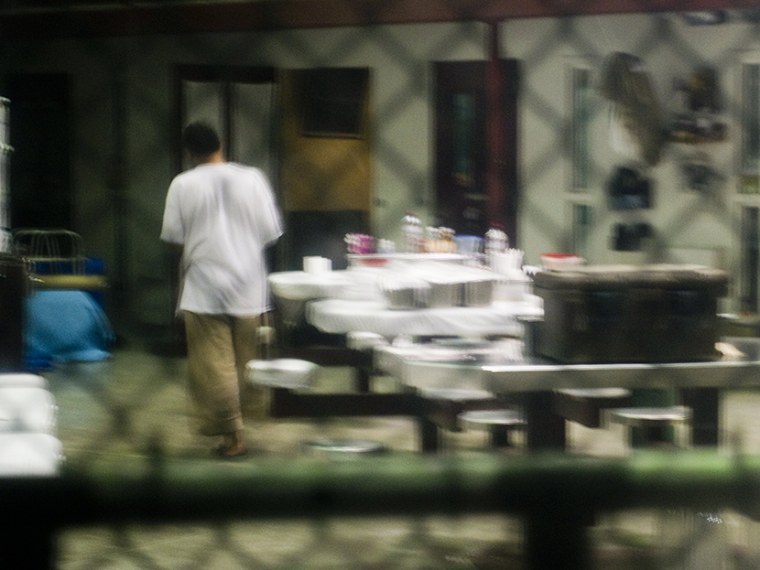Two weeks ago, the Pentagon claimed that 104 of the remaining 166 men at the Guantanamo Bay prison were on hunger strike. Since then, according to Department of Defense figures, 35 hunger strikers have mysteriously abandoned their protest, leaving 69 prisoners still on strike, with 45 being force-fed twice a day.
"Really, we would attempt to get into the heads of the detainees," Pentagon spokesperson Lt. Col. Todd Breasseale said of efforts to stop the hunger strike. "For the long term health of the detainees, we hope that this downward trend continues."
The strikers may believe their message has been received, or they may be relinquishing their strike for reasons related to the Muslim holy month of Ramadan, which began just before the numbers started dropping. If the Pentagon knows why, it isn't talking. The defense attorneys representing the men still detained at Gitmo however, think they know the answer: They say the Department of Defense is tweaking the stats.
"[The Department of Defense] is perfectly capable of manipulating the numbers," says David Remes, who represents a Yemeni detainee named Hussain Almerfedi who has been detained at Gitmo for more than a decade without charge. "DoD refused to acknowledge there was a hunger strike for as long as a month after it happened."
Officials with the Department of Defense said they could not respond to "detainee allegations" of administrators undercounting the strikers.
Joint Task Force Guantanamo spokesperson Lt. Col. Samuel House told msnbc on Tuesday that, contrary to the allegations of manipulating the numbers, the only way someone can get taken off the hunger strike list is by eating nine consecutive meals and declaring that their strike is over, and that 62 of the 70 of the detainees on hunger strike had actually eaten solid food in the past 24 hours. House said that the process of eating solid food again has to be done slowly for detainees who were force-fed in order to prevent refeeding syndrome. Detainees being force-fed are fed early in the morning or after sundown in order to comport with Muslim religious traditions during Ramadan, during which observant Muslims fast in the daytime. For the first time on Wednesday since the strike began, a detainee being force-fed was taken off the list of hunger strikers.
The hunger strike began in February as a protest against camp guards searching detainees' Qurans, but grew into a larger protest over detainee treatment, indefinite imprisonment, and what defense attorneys said were new, punitive measures put in place by the military leadership. The detainees defense attorneys have maintained that the only way to end the hunger strike is to transfer the detainees and close the camp, something the Obama administration has promised to do since the president's first term. Transfers out of Gitmo have slowed since Congress has put in place restrictions requiring the secretary of defense to personally certify that the transferred detainee will not be a danger to the US in the future.
Lawyers for the detainees argue that the camp's commander, Col. John Bogdan has responded to the strike by putting in place new security procedures that are designed to be punitive. When the strike began, most of the detainees were living communally. However, since the strike's beginning, the military decides whether a detainee is placed back into a communal living situation and how much recreation time they are allowed based on their "level of compliance."
"The whole approach of Colonel Bogdan to break the hunger strike is to make life as miserable as possible for the detainees," Remes said.
A federal judge recently ordered that guards stop invasive body searches of detainees when they go to call or see their lawyers, and that authorities must allow attorneys to visit clients who are weak from the hunger strikes. That order was stayed by a higher court however, so the current procedures remain in place.
Pardiss Kebriaei, an attorney with the Center for Constitutional Rights who represents three men detained at Guantanamo, said her clients requested that they only communicate in letters in order to avoid the searches, which she says occur up to eight times between the camp and the are where detainees have phone access—four times each way.
Remes said that when he spoke to Almerfedi earlier this week over the phone, his client told him through a translator that "as far as he knows, the hunger strike is still going strong, and he knows of no one who has dropped out." Almerfedi is alleged in military documents to have been an al-Qaida facilitator. He was ordered released by a federal judge two years ago, but that ruling was later overturned by an appeals court.
Kebriaei said that she hadn't spoken directly to her clients since June, but that she was skeptical of the military's claim that the hunger strike had waned.
"When I was there in June the mood in the camps was very much being determined to continue," Kebriaei says. "They didn't want to die, they wanted to be heard."
